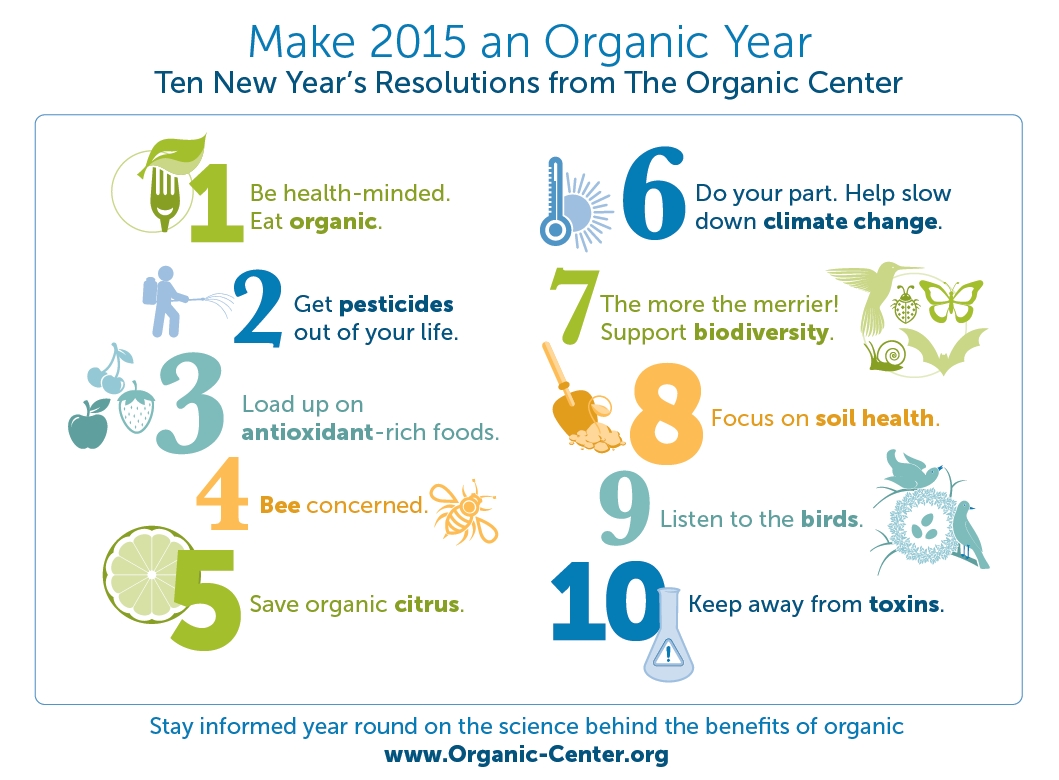Organic New Year’s Resolutions for 2015
2014 was a big year for science supporting the benefits of organic food and farming, particularly for human health, pollinator health, and the health of the environment. The Organic Center has transformed the top ten studies into New Year’s resolutions showing how to improve your diet and the state of our planet by choosing organic. And 2015 is expected to bring even more positive findings!
Resolutions
1. Be health-minded by eating organic
An investigative team reviewing current research on the effects of organic agriculture and crops on public health found a clear health advantage of consuming organic. Published in the International Journal of Environmental Research and Public Health, findings concluded that lower pesticide residues in organic produce may be a significant factor in helping account for those benefits.
2. Reduce your pesticide exposure
Pesticides, linked to numerous health problems, are still found on conventional produce in the grocery store aisles. A study concluded that eating an organic diet for just seven days can significantly reduce your exposure to pesticides. The research found pesticide metabolite levels in a group of individuals who ate a diet of at last 80 percent organic for a week were cut by up to 96 percent by eating organic.
 3. Increase your antioxidant intake
3. Increase your antioxidant intake
One of the most interesting studies showed organic fruit and vegetables have higher levels of antioxidants. Researchers showed that if you choose organic rather than conventional fruits and vegetables, you can get an average of 20-40 percent more antioxidants. Antioxidants protect our cells against the effects of free radicals, which can damage cells in the body and trigger disease.
4. Stop bee population decline
Commercial beekeepers now lose an average of 30 percent of their colonies each winter. This poses a problem for bee-pollinated crops such as almonds, apples, cucumbers, avocados, oranges, and berries. One of the major contributors to bee deaths is exposure to pesticides, particularly neonicotinoids. In 2014, a new study published by Harvard researchers found further evidence of the link between neonicotinoid use and colony collapse disorder.
A disease called citrus greening has been wiping out thousands of acres of citrus trees in the United States. Unfortunately, research on controlling this disease focuses on toxic pesticide sprays and the development of GMO citrus varieties. The Organic Center has teamed up with professors at universities, industry members, and organic growers to launch a large-scale study looking at organic solutions to citrus greening. Visit the Organic Center Citrus Greening page.
6. Help mitigate climate change
Research shows good news for climate change mitigation: organically managed soils could reverse the trend of increasing CO2 in the atmosphere! Conducted by the Rodale Institute, the research takes an in-depth look at how farming systems affect greenhouse gas emission and illustrates the ability of soil to mitigate climate change when managed organically.
 Photo Credit: Biodiversity Act
Photo Credit: Biodiversity Act
7. Support biodiversity
A study published in the Journal of Applied Ecology found that organic farms support more species than conventional farms. On average, organic farms support 34 percent more plant, insect, and animal species than conventional farms. When the researchers looked at pollinators such as bees individually, they found that organic farms had 50 percent higher species diversity.
8. Focus on soil health
A study focusing on healthy soil biodiversity published in Agronomy for Sustainable Development found that conservation and organic farming techniques boost the number of soil organisms when compared to conventional farming. The researchers measured soil life over a period of 14 years, and found the organic and conservation agriculture systems had more earthworms in the soil, 30 to 70 percent more microorganisms, and improved bacterial pathways.
9. Listen to the birds
Research shows that organic farming is healthier for birds. Songbirds are especially sensitive to agricultural dangers, because conventional farms can cause a reduction in food for young songbirds unable to leave their nests. An article in Agriculture, Ecosystems & Environment compared availability of nestling food on organic and conventional farms. Because they do not use synthetic pesticides and have longer, more diverse crop rotations, organic farms provide more available nestling food than conventional farms.
10. Avoid toxins
Avoiding pesticides may be even more important than previously thought. A study lead by Organic Center Science Advisory Board member Professor Gilles-Eric Séralini showed that major pesticides are more toxic to humans than suggested by their active ingredients. Pesticides contain a mix of “inerts,” which are not taken into account in safety testing trials. This research looked at the toxicity of herbicides, fungicides, and insecticides when all ingredients were included, and found that eight out of nine pesticide formulations were up to one thousand times more toxic than their active ingredients.
Science to watch for in 2015
2015 promises to be an exciting year for science supporting the benefit of organic.
International Year of the Soils
Keep an eye out for more research showing organic farming’s benefits to soil health. The Organic Center is collaborating with the National Soil Project to test organic matter on organic versus conventional farms to quantify the extent to which conventional fertilizers have degraded soils. Interested in donating samples (and receiving a free soil analysis in return)? Instructions are on the Organic Center’s Soil Health Science webpage.
Nitrogen pollution
Nitrogen pollution causes eutrophication of aquatic environments and “Dead Zones” in the coastal ocean, contributes to climate change, acid rain, smog, biodiversity loss, and more. In February, The Organic Center plans to complete a definitive study, in collaboration with Professor Jim Galloway of the University of Virginia, comparing nitrogen pollution produced by organic versus conventional crops, along with a nitrogen calculator allowing consumers to measure their nitrogen footprint based on food choices.
Dietary exposure to pesticide residues
The Organic Center is working with Professor Alex Lu of Harvard University to look at the complicated molecular pathways that might be altered by daily exposure to low doses of pesticide residues.
Stay on top of the most current research by frequently visiting the Organic Center website, which provides study summaries, interviews with researcher, blog posts on cutting-edge issues, and science-backed recipes.








